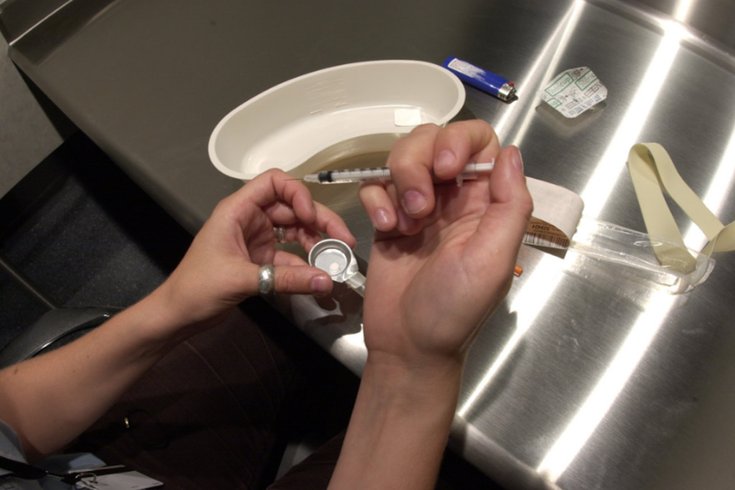
January 23, 2018
 Source/Vancouver Coastal Health
Source/Vancouver Coastal Health
Insite, North America’s first legal supervised injection site, opened in 2003 in Vancouver’s Downtown Eastside. The facility operates under a Health Canada exemption from prosecution under federal drug laws. Philadelphia officials visited the facility as it works toward opening one in this city.
Philadelphia may become one of the first American cities to open a safe injection site – an area where drug users can take opioids under the supervision of medical personnel and without fear of arrest.
City officials announced on Tuesday that they will welcome a private company opening a safe injection site for people battling addiction to opioids, including heroin.
Opening a safe injection site – or Comprehensive User Engagement Sites, by the city's terminology – was among several recommendations presented last year by Mayor Jim Kenney's task force to combat the opioid epidemic.
Now, city officials seek to convene private stakeholders willing to fund and operate at least one safe injection site in Philadelphia. But the city itself will not operate the site.
An operator has not yet come forward and potential sites have not yet been determined. But city officials view a safe injection site as an opportunity to reduce fatal overdoses, prevent the spread of diseases like HIV and help people find treatment for their addiction.
"Philadelphia's fatal overdose rate is the worst in the nation among large cities, and incidents of overdose have steadily increased to an alarming degree," Kenney said in a statement. "I applaud the work of the task force and city leadership in taking this bold action to help save lives."
Safe injection sites will allow opioid users to take drugs under medical supervision in an environment equipped with naloxone, an opioid overdose antidote. Drug users will have access to clean injection equipment and can be referred to treatment and social services.
A safe injection site could save between 24 and 76 lives per year, according to a scientific review of safe injection sites released by city officials. It also could prevent as many as 18 cases of HIV and 213 cases of hepatitis C.
Dr. Thomas Farley, the city's health commissioner, touted those numbers at a press conference announcing the city's support for the controversial practice.
"It will prevent people from dying of overdose," Farley said. "It will also prevent HIV and other infectious diseases. And it will help drug users get into treatment."
Philadelphia has been among the cities hit hardest by the opioid epidemic, which has impacted communities across the nation.
Fatal overdoses have more than doubled in four years. An official count for 2017 is still being tabulated, but city officials expect the number to reach 1,200 fatalities.
In considering safe injection sites, city officials visited Vancouver, British Columbia, which has had safe injection sites for more than 10 years. They also visited nearby Seattle, which is planning its own safe injection site.
Following those site visits, the task force detailed various observations and recommendations, including a need to view safe injection sites as a place to engage drug users with medical and social services.
The task force also found that Vancouver emphasized easy access and has expanded safe injection sites in response to increased overdose deaths from fentanyl.
Vancouver's safe injection sites are operated by nonprofit providers, but primarily funded through the province. By contrast, Seattle plans to fund and operate its own safe injection site.
Philly officials are looking for nonprofit and medical organizations to both operate and fund safe injection sites in the city. The task force recognized that the city government is not positioned well to fund and operate a site with the expediency needed.
Many city officials are onboard with the plans to open a safe injection site, including Kenney and new District Attorney Larry Krasner, who joined several task force members at the press conference.
No legislation is necessary for an organization to open a safe injection site in Philadelphia, city officials said. But they admitted there are many questions that will need to be answered, including how police and emergency service personnel will work alongside the site.
"We are looking forward to engaging in the conversations about those questions," First Deputy Managing Director Brian Abernathy said. "This is really our first step into this. We have a long way to go. This is our first baby step."
Police Commissioner Richard Ross stood alongside task force members as they announced their support for the sites. Ross has yet to endorse the idea, but said he is now "open" to exploring the possibility.
"I went from being adamantly against it to having an open mind," Ross said. "I really have a lot of questions. What would our role be? What does that look like to us? What am I asking police officers to do?"
Fire Commissioner Adam Thiel said he also initially opposed safe injections sites, but after observing them at work in Vancouver, he became a believer.
"If anybody can make this work, this city can – working together," Thiel said. "We can get this done. We have to do everything possible to try to save these lives. That's really what this is about."
In addition to recommending a safe injection site, the task force has launched a media campaign detailing the risks of prescription painkillers, urged local healthcare providers to reduce opioid prescriptions and distributed 35,000 doses of naloxone.
Last week, the city filed a lawsuit against several pharmaceutical companies, claiming they are partially liable for the addiction crisis that has plagued the city.
The lawsuit seeks to have the companies pay for costs incurred by the city as a result of the opioid crisis, including expenses for addiction treatment.
It also demands the companies halt alleged deceptive marketing practices, which officials claim have caused an exponential rise in prescription opioid sales.